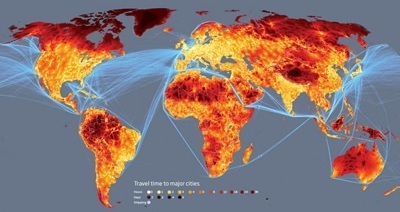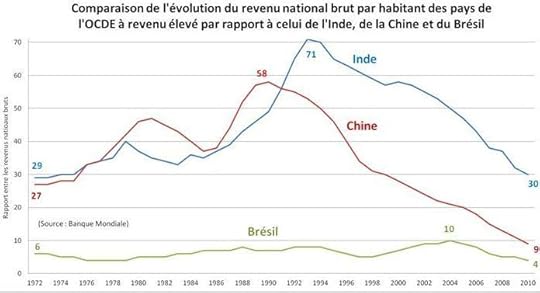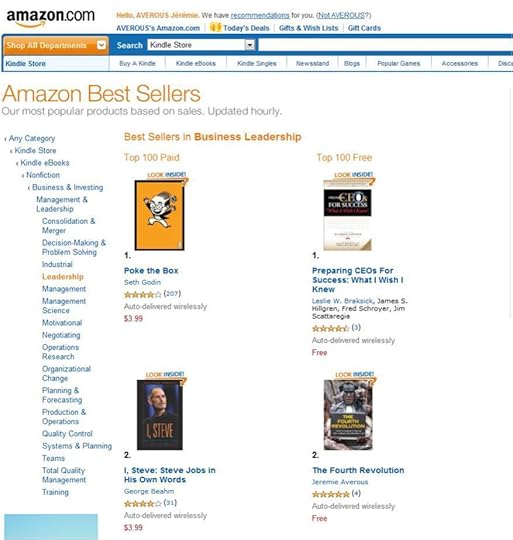Jeremie Averous's Blog, page 157
January 10, 2012
When will governments finally realize that the interconnected economy is already here?
The world acts today as if governments still lived in the good ol' days of powerful national economic policy.
That's just obsolete.
The crisis in the Euro zone shows that economies are truly interconnected, even between continents. We know that there will be soon a dollar crisis as there is currently a euro crisis (the same causes, debt, necessarily causing the same effects). The rest of the world can't just watch doing nothing. We are too interconnected today.
This extremely interesting piece of research about how interconnected private companies really are gives another highlight. Unfortunately the "Big Brother" pitch of the article is I believe, wrong. It is not that a small number of companies would control the world; it is that a limited number of companies are central nodes in the network through the quality and density of their connections. In the terminology of Gladwell, they are 'mavens'.

A fully interconnected world
The big economic powers of the previous century are not really economic power in the sense of imposing their will; they are well connected nodes in a worldwide economical network.
Our governments must stop behaving as if we were 50 years ago. The solutions to the 1929 crisis won't apply today.
We are all interconnected. We not only need an economical coordination at the European level, we need one at the Global level. The Fourth Revolution will change forever the balance of power from the Industrial Age; adjustments will be difficult but necessary. Only with the right coordination of economic policy will their effects be more smooth, avoiding deep, damaging crisis.
Ladies and gentlemen in government, the Fourth Revolution is here. Be proactive. See that we are all interconnected and act in consequence. Will you?

January 7, 2012
A surprisingly easy way to improve your brain's cognitive capabilities
Look at this guy. Right now he is improving the capabilities… of his brain!

ready to exercise your brain?
Well, that's what this article from the New York Times, "How exercise benefits the brain" says.
One of the most useful discoveries of the Fourth Revolution period is our understanding of how our body and our brain are interlinked. It has huge consequences explained in the Fourth Revolution book, and also in the Fourth Revolution Manifesto part VII (p16 and following).
I have been raised in a very rational household where the brain capabilities were praised and the body was discounted as some inevitable and annoying appendix. The thing is that there are more and more proofs that our body participates significantly to our intelligence and our cognitive abilities. Our emotions (bodily reactions) do in fact influence our actions – for our good most of the time. And we know that our posture influences our mood and our receptiveness to others.
I have now the discipline of doing some easy deep breathing exercises in the morning for only 5mins – and it really changes my day. When do you start having routines acting on your body to work on your mood and your cognitive capabilities?

January 5, 2012
The Great Convergence of the world economy is happening NOW
The economical convergence of the world has started. This graph is extracted from an article by Robert Branche (in French): "Facing the convergence of the world economy".

OCDE vs emerging countries: GDP per capita over time
It shows the evolution over time of the ratio of the GDP per capita of a choice of emerging countries (Brazil, China and India) over the OECD average. There is no doubt in this graph that a convergence starts around 1994 – around the time the Fourth Revolution started, at least for India and China. This happens at the same time than the significant shift in the value creation chain in the 1990′s (see the post "Visualizing the demise of manufacturing").
This convergence will continue. Ultimately the GDP per capita of China and India will be close (on average) to the OECD countries.
What will be the final outcome? For Robert Branche the outcome will be necessarily, a decrease of the standard of living in the OECD countries by about 50% until 2050. The reason stated is that the standard of living in the OECD is artificially high thanks to low-cost importations from China and India – which will become more expensive. Is that so problematic? It would mean that the standard of living would be back to say, the one the OECD had in the 1980′s. Is that a big issue?
While the worldwide economic convergence will probably accelerate thanks to the Fourth Revolution, the outcome, in terms of standard of living in developed countries, is more debatable. Developed countries will see significant changes in their economy; whether they lean into them or resist them will decide on their ultimate fate. Countries can go down in terms of standard of living very quickly (as in Argentina in the 1970 to 1990′s for example). On the other hand, if developed countries adopt the Fourth Revolution early enough, there is no reason why the standard of living, and the quality of life, should be significantly lowered.
In any case the world will see more shifts of wealth and standards of living in the next 50 years than in the 20th century.
Listen to the warning: let's lean into the Fourth Revolution. That is the only way developed countries can preserve their future.

January 4, 2012
How the current financial turmoil is a positive indicator of the Fourth Revolution
The financial world is going through a storm. The balance of economy is shifting. What was not a problem before (sovereign debt) is a problem now. Developed economies are in turmoil. Manufacturing and utility companies suffer. Stock markets undergo shock after shock. Still, the companies that embody the Fourth Revolution, those companies of the internet, do not seem to suffer. They continue to grow.
What happens?

historical railroad stock 19th century
An interesting similar situation happened in the 19th century when the development of railroad redefined the economy and value chain for many products. Many startups were created, that contributed to a fantastic development of the railroad network.
And the stock market suffered shock after shock as the economy adjusted to the new, tremendous value brought by speedy transportation. There were regular crisis, there were regular financial panics, in all developed countries like the US, UK or France. New and old companies collapsed.
Still the railroad networks continued to develop through the successive crisis and the economy really took all the benefit of the economies of scale brought by the Industrial Age.
The fact that the stock market suffers crisis is not just the result of speculation. It is a sure sign that the economy is trying to adjust to a significant shift of the value chain creation.

financial panic in the 19th century over railroad stocks
Like it happened in the 19th century, it happens again today. The pictures of the financial crisis of the 19th century remind us of those pictures of today.
The world struggles to adjust to a new balance of value creation, the value brought by the Fourth Revolution. It removes borders; it accelerates exchange of goods and ideas; it changes significantly the value chain by diminishing the relative value of extractive and manufacturing industries.
The current economic crisis is another precursor of the Fourth Revolution. We can help minimize its impact by recognizing that it is an effect of the Fourth Revolution. By leaning into it instead of adopting defensive positions.
Are you ready to shift to the Fourth Revolution value production and diffusion system?

January 2, 2012
The Fourth Revolution book is #2 in Leadership bestsellers on Amazon.com Kindle store!
The Fourth Revolution book has been downloaded HUNDREDS of time already since the promotion for a FREE download has started. THANKS TO YOU, it has made it already to the #2 bestselling book on Amazon.com Kindle shop for Leadership – category Free Kindles, alongside well known books and authors (see below)!

The Fourth Revolution book #2 in Leadership bestsellers on Amazon.com! (Jan 2 at 9pm Singapore time)
It has also made it to #4 on Amazon.co.uk Kindle store "management and leadership" category, #1 in Amazon.fr Kindle store english books "Futurology" category and #2 in Amazon.fr Kindle store "Leadership" category!
The Fourth Revolution on Amazon.com's Kindle store
The Fourth Revolution on Amazon.co.uk's Kindle store
The Fourth Revolution on Amazon.fr's Kindle store
The Fourth Revolution on Amazon.de's Kindle store
Still 36 hours to get your free Kindle copy and understand the Fourth Revolution – and thrive through the world's transformation! Don't miss the opportunity!!

December 31, 2011
For the new year, the Fourth Revolution for free on Kindle for 72h only! Happy New Year!
2012 will be a year of changes. Changes to the world, changes to you. 2012 will be the year of the Fourth Revolution.

2012 - the revolution year!
To celebrate this new year, the Fourth Revolution book on Kindle is free for 72 hours only!
The Fourth Revolution on Amazon.com's Kindle store
The Fourth Revolution on Amazon.co.uk's Kindle store
The Fourth Revolution on Amazon.fr's Kindle store
The Fourth Revolution on Amazon.de's Kindle store
Read the Fourth Revolution book and change your life!
Happy new year 2012!

This year's 10 most popular Fourth Revolution Blog posts
At the time where we wish good bye to 2011 and we prepare ourselves for an exciting year 2012 ahead, I thought I would list the 10 most popular blog posts of the year for the Fourth Revolution Blog for your (re-)reading pleasure:
Bonus: positive emotions improve health!
Open data hacking: Fourth Revolution value creation in action
How simple is it to get positive emotions?
How algorithms change our world (video of the month)
What's the use of feeling more positive?
Establishing effective co-located teams is not in contradiction with the Fourth Revolution
How the "War of Art" changed me
Stop disseminating the image of the factory worker as a representation of the economy!
Soft power leadership: what about a book?
Co-creation or the Fourth Revolution in action
Bonus: read this exclusive post by Jeremie published by SocialMediaToday, "5 reasons organizations don't implement internal social networks and 5 reasons they should", seen by 450 people and counting!
I wish you all, and your families, an exciting and fulfilling new year 2012!

December 29, 2011
Would you guess that people read more or less with digital books?
Today Amazon sells more digital books than physical books. This is a dramatic shift in this industry and publishers struggle to adapt. The struggle of an industry – an institution – seeing its Industrial Age business model crumble should not hide the most important: the actual dissemination of information.

e-readers like Amazon's kindle make people read more books
Overall, do people read less or more books than before?
According to this MediaPost detailed article and statistics, people who have bought e-books tend to download and read more books than before. It appears to be statistically significant.
Why is that? For sure, clever marketing by Amazon makes it easy to download and consume more. When it comes to reading, my own experience is that the small, lightweight and convenient size of e-books allows to read in many places like the underground train or whenever there is a short break. And I definitely read even more since I have an entire library inside my Kindle, making a switch from a book to another easy.
So, the introduction of e-books did not kill reading. It increased it, at the same time as it made many non-mainstream or old books available to everybody. And, taking into account the vast amount of other information we read on other media, such an availability of high quality information is unprecedented. It will necessarily be the source of many creative innovations.
Think about it. I can download on my e-reader in less than 1 minute any title available worldwide without the bother of the logistics of sending physical books over (and I am living in Singapore, so this problem is particularly sensitive!). WOW.
Who said the Fourth Revolution is not yet here?

December 27, 2011
The one thing organizations that want to move Collaborative need
Moving to the Collaborative Age is simple… but not easy!
Many organizations just touch collaborative tools from far, sometimes just using them as another broadcasting tool.
The thing is, organizations need to dramatically change their approach to be able to take advantage of all the value made available by the Collaborative Age.
This excellent post by Amber Naslund, The Ripple Effect: Why Social Business Isn't Simple, is an excellent summary of some tactics organizations can adopt if their strategy is truly to move into the Collaborative field.
Still, whatever the techniques and tactics, something is required first. It is a deep commitment of the organization, at the highest level, to engage with the social community. Engagement means a two way conversation and emotional exchange. Engagement has a cost. It requires continuous maintenance. It requires emotional work and vigilance. Yet it can lead to fantastic stories and experiences.
Like everybody, you want to jump into the Collaborative World. Still – are you really deeply ready to engage emotionally with your network, with your customers and your entire ecosystem?

December 24, 2011
What is your secure base? Strengthen it to over-achieve!
We all need our secure base.
It's a place behind us where we know we can go and rest, be protected and supported. A place we can relax and recover.
The stronger our secure base is, the keener we will be to take risks. Because we know that if we fail, our secure base will be here.

a strong secure base
Our very first secure base is our mother. And then over time we develop other secure bases – our significant other, our coach, close friends.
What's important is to always have one strong secure base. People that don't have one, or that lose their secure base suddenly, can have extreme reactions if they get stuck in the mourning cycle (more about that in the excellent book "hostage at the table" by George Kohlrieser, a hostage negotiator turned business school professor).
So, you want to move forward, do new things, experiment? Make sure your secure base is strong and that it will welcome you in whatever conditions you'll end up. Strengthen your secure base as often as you can. The stronger the secure base, the bolder you will be, the more successful you will ultimately become. Invest in strengthening your secure base, it is not time lost.
Have you identified your secure base? Start strengthening it NOW!
Enjoy Christmas, reconnect with your secure base and strengthen it to achieve extraordinary things in 2012!!
Merry Christmas to all Christian friends!




